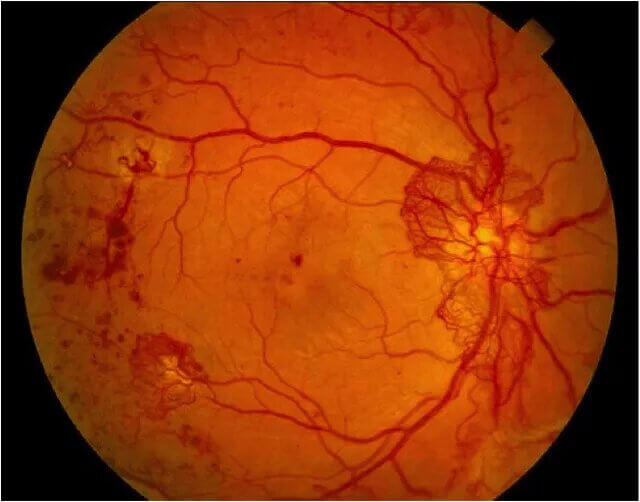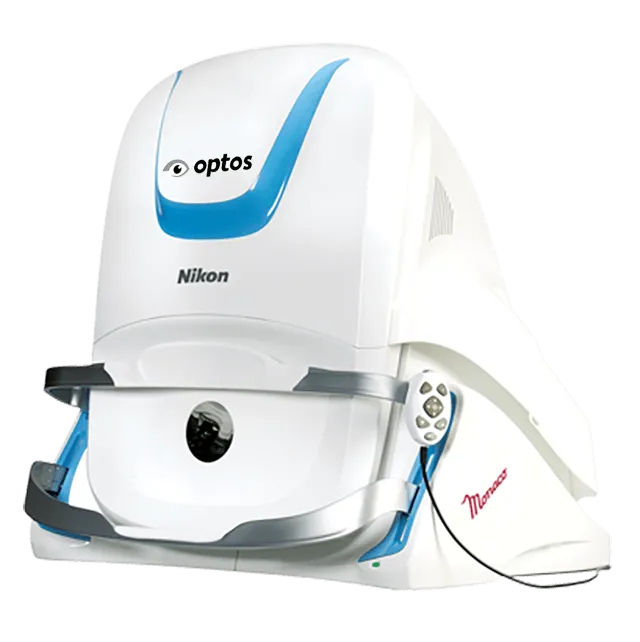



Early diabetic retinopathy (nonproliferative diabetic retinopathy) usually starts with small retinal hemorrhages and white spots called cotton-wool spots. Small red spots called microaneurysms can also form, which can leak fluid. If this happens in the central part of the retina, it can affect vision and is called macular edema.
Because diabetes can affect small blood vessels, it can cause a lack of oxygenation to the retinal periphery. This makes the eye produce new blood vessels in an effort to help solve the problem. Unfortunately, the new vessels are very fragile and can break and cause large vitreous hemorrhages. They can even cause retinal detachments as they create scar tissue that pulls on the retina. Additionally, the new blood vessels can grow in the wrong places and even cause glaucoma! Once new blood vessels form, it is called proliferative diabetic retinopathy and requires treatment by a retina specialist.
Optomap ultra-widefield retinal imaging is an advanced diagnostic technique that captures a comprehensive retina view, extending beyond traditional imaging methods. This technology uses a scanning laser to produce detailed images of the peripheral retina, helping to detect various eye conditions early. The ultra-wide field coverage enhances ocular health assessment, allowing for a more thorough retina examination and facilitating timely intervention for potential eye issues.
Optomap Ultra-widefield Retinal Imaging employs a scanning laser ophthalmoscope to capture detailed images of the entire retina. After pupil dilation, the patient faces the Optomap device, where the laser scans the retina, and reflected light forms high-resolution digital images. The technology provides a broader view than traditional methods, helping with the early detection and monitoring of various eye conditions such as diabetic retinopathy and macular degeneration. The digital format facilitates easy storage and comparison of images over time.

Take control of your eye health with Optomap Ultra-widefield Retinal Imaging. Detecting issues early, it offers comprehensive, non-invasive exams, ensuring you and your family's vision is in good hands. Make the smart choice for your eyes and book your appointment with Remagin now. Take the first step towards comprehensive eye care with Remagin and experience the peace of mind of knowing your health is protected. Schedule your Optomap screening with us today.
It is a condition that affects the eyes and vision due to diabetes. Specifically, it is the result of uncontrolled blood sugars. It can occur in patients with type 1 or type 2 diabetes.
In the beginning, patients with diabetic retinopathy may experience no outward symptoms. This is one reason annual ophthalmology screenings are so vital to all diabetic patients. Once the condition progresses, patients can see spots within their line of vision, have fluctuating or blurry vision, or suffer from vision loss. If left unchecked, it may lead to blindness.
This condition is typically diagnosed during an eye exam. If our doctor notices something concerning, he may conduct a fluorescein angiography. This involves injecting a special dye through the vein in the patient’s arm and taking images as that dye circulates through the blood vessels in the eyes. This helps to identify which blood vessels are broken, closed, or leaking fluid. Additionally, our ophthalmologist may recommend an OCT (optical coherence tomography). This can be used to determine and measure retinal thickness. It also helps to locate any swelling of the macula and measure it.
There is no cure for diabetic retinopathy. However, the progression of the condition can be slowed, if not halted completely, with effective treatment.
Blood sugar and blood pressure control are two of the most important treatments for diabetic retinopathy. While it is impossible to cure the condition, there are treatments that may, in some cases, reverse some of the damage. This includes surgical interventions, steroid injections into the eye, and anti-VEGF injections into the eye.
Remagin in Windermere, Florida, serves patients throughout West Orlando, offering insightful treatment and compassionate care for all our patients. We work hard to identify the best treatment options for our patients’ unique situations, whether it is for diabetic retinopathy or other underlying issues. Contact us today at (407) 704-3937 to schedule your eye exam and get answers to any eye health questions you may have.